NewsBrief, 28 July – 10 August 2015
- Mali hotel siege suggests militant attacks may be spreading
- Africa50 initiative raises USD 830 million for infrastructure
- Côte d'Ivoire sets presidential election date
- Good Practices Forum focuses on maternal and child health
- SWAC viewpoint: Challenges for the transformation of West Africa's agricultural systems
- Publication - Regional overview of food insecurity: Africa
- Maps & Facts: Progress towards achieving food security in Africa
The next NewsBrief will be published on 2 September 2015.
Mali hotel siege suggests militant attacks may be spreading
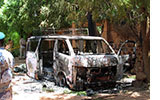 At least 12 people were killed in an attack that shows militant groups may be expanding their reach in Mali. Gunman struck in the early hours of 7 August, targeting an army camp in the central town of Sévaré, about 600 km from Bamako. After encountering resistance at the army camp, the attackers moved on to a nearby hotel, taking four UN workers as hostages. Sévaré is also a base of operations for the UN peacekeeping mission, and the Hotel Byblos is frequented by UN troops and staff. Backed by French soldiers, Mali special forces quickly responded, freeing four hostages after a 24-hour standoff with the militants. Authorities said five Malian soldiers and several UN workers and hotel staff were among the dead. No one has claimed responsibility for the attack, but authorities suspect Islamist extremists that have remained active in the country despite the signing of a comprehensive peace accord in June. Analysts said it's the first time jihadists have carried out such an attack in central Mali, suggesting that militants are expanding their reach outside their strongholds in the north of the country. In a statement, the UN Secretary-General condemned the attack and said it will not weaken the international community's resolve in the fight against extremists in Mali. "This attack will not lessen the determination of the United Nations to accompany the Malian people in their efforts to implement the peace agreement. The Secretary-General calls upon the people of Mali and the parties to the agreement to remain united in their pursuit of a just and sustainable peace," the statement said. The attack also drew condemnation from the Co-ordination of Azawad Movements (CMA), an alliance of Touareg and other former rebel groups that have signed the peace deal.
At least 12 people were killed in an attack that shows militant groups may be expanding their reach in Mali. Gunman struck in the early hours of 7 August, targeting an army camp in the central town of Sévaré, about 600 km from Bamako. After encountering resistance at the army camp, the attackers moved on to a nearby hotel, taking four UN workers as hostages. Sévaré is also a base of operations for the UN peacekeeping mission, and the Hotel Byblos is frequented by UN troops and staff. Backed by French soldiers, Mali special forces quickly responded, freeing four hostages after a 24-hour standoff with the militants. Authorities said five Malian soldiers and several UN workers and hotel staff were among the dead. No one has claimed responsibility for the attack, but authorities suspect Islamist extremists that have remained active in the country despite the signing of a comprehensive peace accord in June. Analysts said it's the first time jihadists have carried out such an attack in central Mali, suggesting that militants are expanding their reach outside their strongholds in the north of the country. In a statement, the UN Secretary-General condemned the attack and said it will not weaken the international community's resolve in the fight against extremists in Mali. "This attack will not lessen the determination of the United Nations to accompany the Malian people in their efforts to implement the peace agreement. The Secretary-General calls upon the people of Mali and the parties to the agreement to remain united in their pursuit of a just and sustainable peace," the statement said. The attack also drew condemnation from the Co-ordination of Azawad Movements (CMA), an alliance of Touareg and other former rebel groups that have signed the peace deal.
Article in English: http://www.nytimes.com/4-rescued-in-mali-hotel-attack.html
Article in French: http://fr.africatime.com/mali/attaques-terroristes-sevare
Africa50 initiative raises USD 830 million for infrastructure
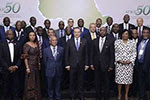 West African nations make up the majority of countries that have signed on to a new initiative to boost infrastructure development in the continent. Backed by the African Development Bank (AfDB), the Africa50 investment platform convened its Constitutive General Assembly on 29 July in Casablanca, Morocco. The Bank and 20 African countries have raised an initial USD 830 million to finance critical infrastructure projects across the continent. Of the 20 founding countries, eleven are from the West Africa region: Benin, Côte d'Ivoire, The Gambia, Ghana, Mali, Mauritania, Nigeria, Niger, Senegal, Sierra Leone and Togo. "The large presence of African states and their financial commitments are a testimony to a shared vision to find new ways to accelerate the provision of infrastructure," said Donald Kaberuka, the out-going AfDB president and chairman of the Africa50 board of directors. "Africa50 will be a step change for infrastructure financing and development in Africa." While impressive, the amount raised is only a fraction of what experts say is needed to close the funding gap for infrastructure development in Africa. By some estimates, the continent faces and annual shortfall of USD 40 billion of the USD 90 billion in investment needed each year. The Africa50 initiative aims to reach a capitalisation of USD 3 billion in the medium term by attracting other African countries as well as non-sovereign investors from within and outside of Africa.
West African nations make up the majority of countries that have signed on to a new initiative to boost infrastructure development in the continent. Backed by the African Development Bank (AfDB), the Africa50 investment platform convened its Constitutive General Assembly on 29 July in Casablanca, Morocco. The Bank and 20 African countries have raised an initial USD 830 million to finance critical infrastructure projects across the continent. Of the 20 founding countries, eleven are from the West Africa region: Benin, Côte d'Ivoire, The Gambia, Ghana, Mali, Mauritania, Nigeria, Niger, Senegal, Sierra Leone and Togo. "The large presence of African states and their financial commitments are a testimony to a shared vision to find new ways to accelerate the provision of infrastructure," said Donald Kaberuka, the out-going AfDB president and chairman of the Africa50 board of directors. "Africa50 will be a step change for infrastructure financing and development in Africa." While impressive, the amount raised is only a fraction of what experts say is needed to close the funding gap for infrastructure development in Africa. By some estimates, the continent faces and annual shortfall of USD 40 billion of the USD 90 billion in investment needed each year. The Africa50 initiative aims to reach a capitalisation of USD 3 billion in the medium term by attracting other African countries as well as non-sovereign investors from within and outside of Africa.
Article in English: http://allafrica.com/stories/201507310709.html
Article in English: http://www.afdb.org/eafrica50-14557/
Article in French: http://www.financialafrik.com/infrastructures-en-afrique/
Côte d'Ivoire sets presidential election date
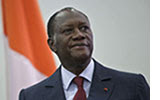 Côte d'Ivoire has set 25 October 2015 as the date for the country's first presidential election since the 2010 vote that resulted in fighting that killed 3 000 people. The government made the announcement on 5 August, and President Alassane Ouattara registered his candidacy the same day. A successful election is critical to reinforce stability in Côte d'Ivoire after a decade of war and turmoil. "This election is important for our country, for our democratic process, to turn the page on the crisis," Ouattara told reporters after filing his paperwork. "I want this election to be peaceful and for the results to be accepted by everyone." Supporters of former President Laurent Gbagbo, who refused to step aside after he was declared the loser in 2010, threatened to boycott the election if steps are not taken to ensure a free and fair vote. A spokesman for the opposition Ivorian Popular Front (FPI) said the current political and security conditions are not conducive to a credible election. "Former president Gbagbo's party is not taking part in this election in the current condition in the sense that the electoral commission is unbalanced," FPI spokesman Boubakar Kone said. "The Constitutional Court [is] ... made up of Mr Ouattara's friends and cannot be fair; the voter list is biased. There are so many problems we have to solve first."
Côte d'Ivoire has set 25 October 2015 as the date for the country's first presidential election since the 2010 vote that resulted in fighting that killed 3 000 people. The government made the announcement on 5 August, and President Alassane Ouattara registered his candidacy the same day. A successful election is critical to reinforce stability in Côte d'Ivoire after a decade of war and turmoil. "This election is important for our country, for our democratic process, to turn the page on the crisis," Ouattara told reporters after filing his paperwork. "I want this election to be peaceful and for the results to be accepted by everyone." Supporters of former President Laurent Gbagbo, who refused to step aside after he was declared the loser in 2010, threatened to boycott the election if steps are not taken to ensure a free and fair vote. A spokesman for the opposition Ivorian Popular Front (FPI) said the current political and security conditions are not conducive to a credible election. "Former president Gbagbo's party is not taking part in this election in the current condition in the sense that the electoral commission is unbalanced," FPI spokesman Boubakar Kone said. "The Constitutional Court [is] ... made up of Mr Ouattara's friends and cannot be fair; the voter list is biased. There are so many problems we have to solve first."
Article in English: http://www.agenceecofin.com/presidential-25-october
Article in French: http://news.abidjan.net/h/561008.html
Good Practices Forum focuses on maternal and child health
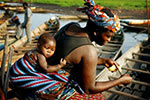 The first edition of ECOWAS Good Practices in Health Forum focused on ending preventable mother and child deaths in West Africa. Organised by the West African Health Organisation (WAHO), in collaboration with member states, USAID and other partners, the meeting brought together 300 health sector stakeholders from West African countries and development partners from 30 to 31 July in Ouagadougou. Following the conclusion of national good practices documentation workshops conducted in nine focus countries in the ECOWAS region, the Forum aimed to identify practical measures to improve the health status of mothers, children and new-borns in the region. Despite some progress in recent decades, West African countries continue to register elevated infant and maternal mortality rates. With the knowledge of proven, cost-effective practices, the director of the USAID health office for West Africa, Rachel Cintron, said the current situation is unacceptable. "A woman who does not go to the clinic to give birth and bleeds to death at home is a death that is preventable," she said. "We already have good practices that exist. We must now extend these practices and no longer ignore the situation in rural areas with women who still do not have access to the care they need."
The first edition of ECOWAS Good Practices in Health Forum focused on ending preventable mother and child deaths in West Africa. Organised by the West African Health Organisation (WAHO), in collaboration with member states, USAID and other partners, the meeting brought together 300 health sector stakeholders from West African countries and development partners from 30 to 31 July in Ouagadougou. Following the conclusion of national good practices documentation workshops conducted in nine focus countries in the ECOWAS region, the Forum aimed to identify practical measures to improve the health status of mothers, children and new-borns in the region. Despite some progress in recent decades, West African countries continue to register elevated infant and maternal mortality rates. With the knowledge of proven, cost-effective practices, the director of the USAID health office for West Africa, Rachel Cintron, said the current situation is unacceptable. "A woman who does not go to the clinic to give birth and bleeds to death at home is a death that is preventable," she said. "We already have good practices that exist. We must now extend these practices and no longer ignore the situation in rural areas with women who still do not have access to the care they need."
Article in English: http://www.inprofiledaily.com/health-forum-today
Article in French: http://www.rfi.fr/sante-maternelle-infantile
WAHO website: http://www.wahooas.org/index2.php?lang=en
SWAC Viewpoint: Challenges for the transformation of West Africa's agricultural systems
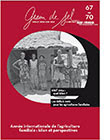 Inter-réseaux Rural Development has devoted the most recent edition of its Grain de sel revue to the issue of family farming in Africa. With contributions from a variety of scholars and practitioners, the magazine examines the policy achievements of the International Year of Family Farming (IYFF) observed in 2014 as well as the challenges facing smallholder producers going forward. In their contribution to the magazine, SWAC economists Thomas Allen and Philipp Heinrigs assess the prospects for family farming in West Africa, taking note of current trends toward larger and more concentrated agricultural enterprises. They argue that the development of family farming in the region will require a transition to a more commercial approach: "Success will depend on the capacity of players to structure sectors and to connect the various links in the chain. The issue of sharing negotiating power in the value chains will arise, as these will be increasingly driven by the downstream operators. Producer organisations have an important role to play in this regard, particularly in terms of access to information and collaboration with institutions. It is also essential that the connections between production areas and urban markets are better understood and facilitated. The development of agricultural campaigns will therefore also depend on cross-cutting urban management measures. Finally, the coherence and co-ordination of public policies must be ensured to create synergies between the various instruments of action."
Inter-réseaux Rural Development has devoted the most recent edition of its Grain de sel revue to the issue of family farming in Africa. With contributions from a variety of scholars and practitioners, the magazine examines the policy achievements of the International Year of Family Farming (IYFF) observed in 2014 as well as the challenges facing smallholder producers going forward. In their contribution to the magazine, SWAC economists Thomas Allen and Philipp Heinrigs assess the prospects for family farming in West Africa, taking note of current trends toward larger and more concentrated agricultural enterprises. They argue that the development of family farming in the region will require a transition to a more commercial approach: "Success will depend on the capacity of players to structure sectors and to connect the various links in the chain. The issue of sharing negotiating power in the value chains will arise, as these will be increasingly driven by the downstream operators. Producer organisations have an important role to play in this regard, particularly in terms of access to information and collaboration with institutions. It is also essential that the connections between production areas and urban markets are better understood and facilitated. The development of agricultural campaigns will therefore also depend on cross-cutting urban management measures. Finally, the coherence and co-ordination of public policies must be ensured to create synergies between the various instruments of action."
Article in French: http://www.inter-reseaux.org/IMG/pdf/p.8-9_gdsaf.pdf
Grain de Sel magazine in French: http://www.inter-reseaux.org/grain-sel/lang=fr
Publication - Regional overview of food insecurity: Africa
 The West Africa region leads the continent in progress toward reducing the number of people suffering from hunger and malnutrition. This is one of the findings of the first Regional Overview of Food Insecurity in Africa. "The stark difference between Western Africa and other sub-regions may reside in advances in implementing the Comprehensive Africa Agriculture Development Programme (CAADP) with the Regional Agricultural Policy, Environmental Policy, Water Resource Policy, and Regional Investment Plan through several regional and national programmes and projects." West African regional organisations (ECOWAS, UEMOA, CILSS) have invested extensively in building regional institutions and human capacities for agricultural development in the sub-region, particularly with respect to food security monitoring and risk mitigation. Published by the UN Food and Agriculture Organization, the report concludes that the prospects for food security in Africa are brighter than ever.
The West Africa region leads the continent in progress toward reducing the number of people suffering from hunger and malnutrition. This is one of the findings of the first Regional Overview of Food Insecurity in Africa. "The stark difference between Western Africa and other sub-regions may reside in advances in implementing the Comprehensive Africa Agriculture Development Programme (CAADP) with the Regional Agricultural Policy, Environmental Policy, Water Resource Policy, and Regional Investment Plan through several regional and national programmes and projects." West African regional organisations (ECOWAS, UEMOA, CILSS) have invested extensively in building regional institutions and human capacities for agricultural development in the sub-region, particularly with respect to food security monitoring and risk mitigation. Published by the UN Food and Agriculture Organization, the report concludes that the prospects for food security in Africa are brighter than ever.
FAO Report in English: http://www.fao.org/3/a-i4635e.pdf
FAO Report in French: http://www.fao.org/3/a-i4635f.pdf
Maps & Facts
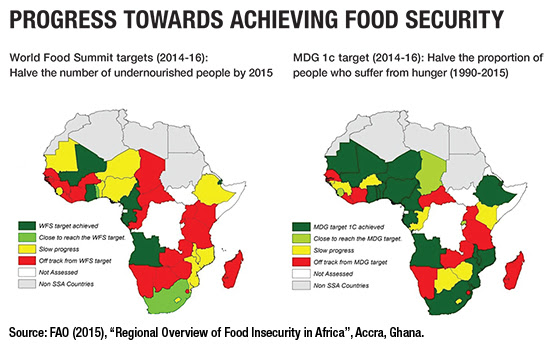
Despite rapid population growth across the region and recurrent droughts in the Sahel, West Africa has reduced the prevalence of undernourishment by 60% over the last two decades, from 24.2% in 1990-92 to 9.6% in 2014-16. Ghana and Mali have achieved both the Millennium Development Goal target of cutting in half the proportion of the population suffering from undernourishment and the World Food Summit target of halving the absolute number of people going hungry by 2015.
Maps & Facts: Progress towards achieving food security: http://www.oecd.org/swac/map/Africa.pdf
